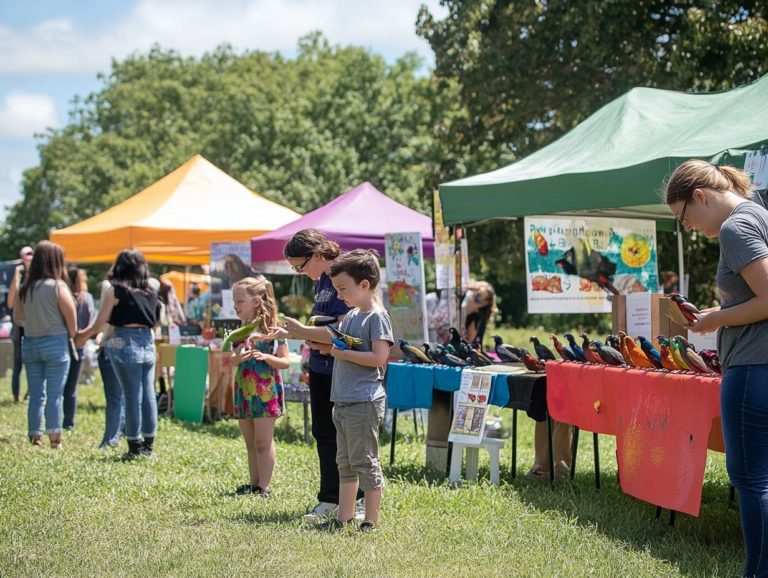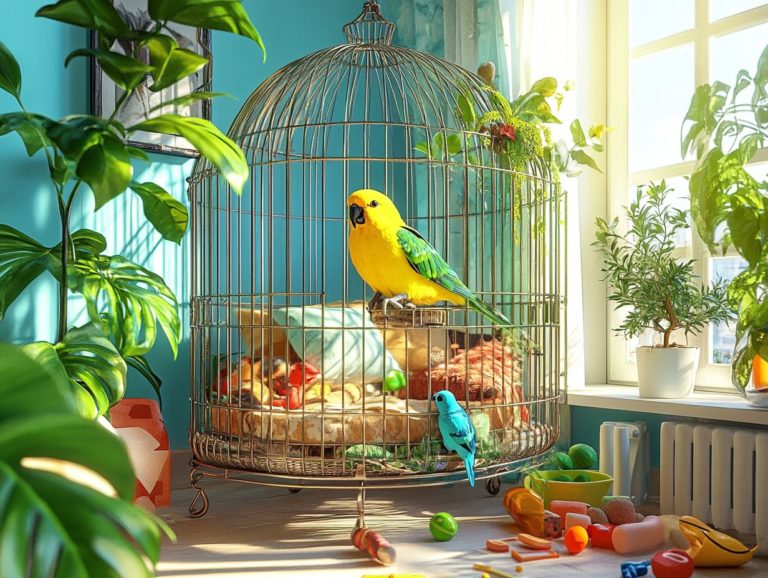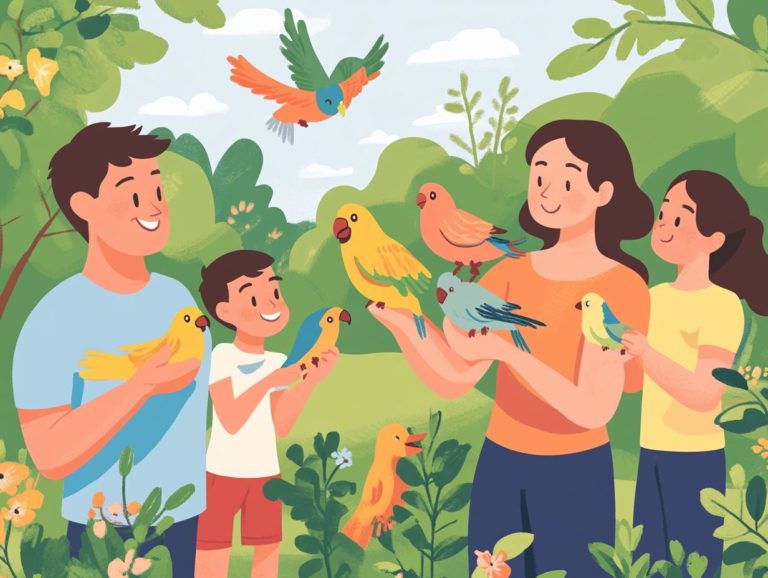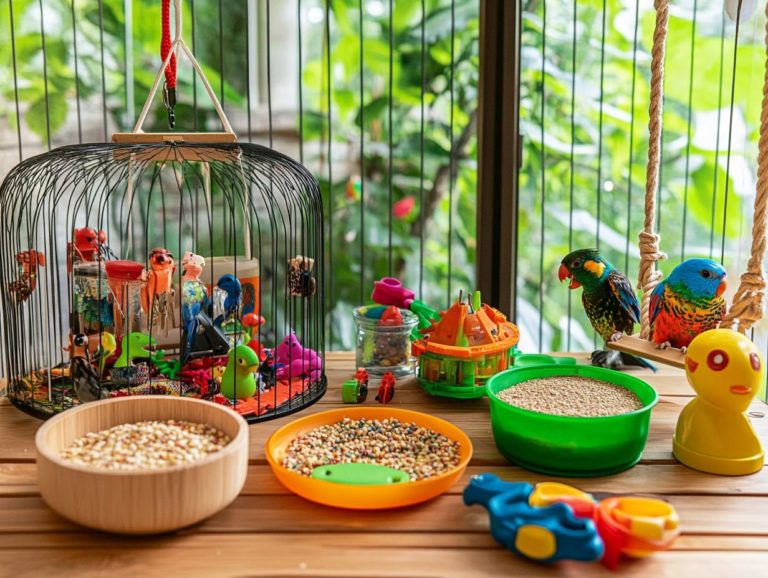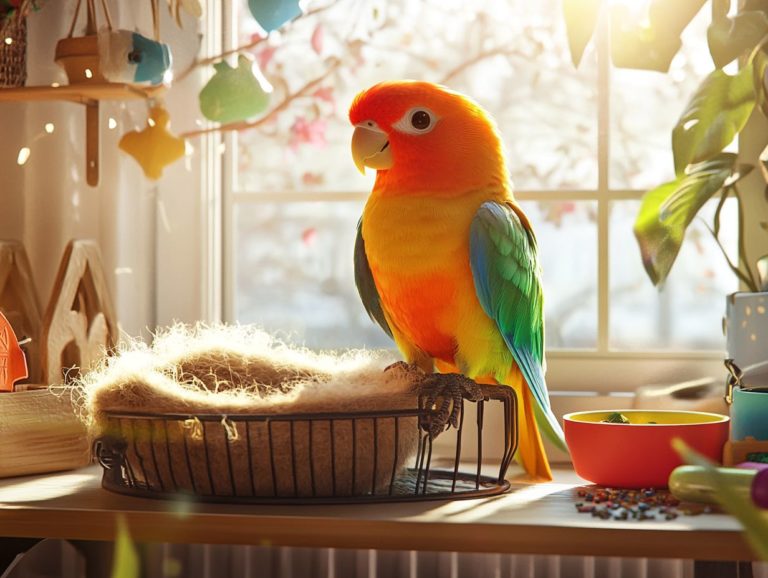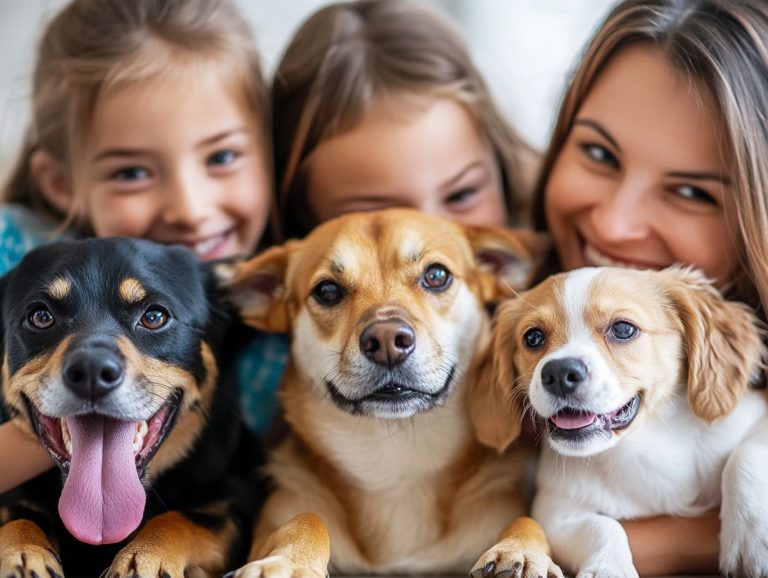How to Find Permanent Homes for Rescued Birds
Finding a permanent home for rescued birds is an essential responsibility that often flies under the radar. These magnificent creatures, who once needed saving, truly deserve a nurturing environment where they can flourish.
This guide will walk you through the critical steps:
- Preparing for your rescued bird
- Gathering the necessary supplies
- Employing effective networking strategies
- Screening potential adopters
By the end, you ll be fully prepared to facilitate a seamless transition for your feathered companion into their forever home.
Contents
Key Takeaways:

- Rescued birds need permanent homes to provide stability and proper care.
- Proper preparation, networking, and screening are important steps in finding a permanent home for a rescued bird.
- Finalizing the adoption process ensures a smooth transition and ongoing care for the bird’s well-being.
Why Rescue Birds Need Permanent Homes
Rescue birds, especially those at organizations like Charlie Brown Bird Rescue, desperately need permanent homes to flourish and escape the harsh realities of abandonment and neglect. Many of these magnificent creatures, such as macaws, cockatoos, lovebirds, and cockatiels, come from backgrounds where their previous owners were unable to provide the necessary care. For potential adopters, knowing how to identify a healthy bird for adoption is crucial in addressing the parrot crisis. We need the community’s awareness now.
A forever home offers a loving sanctuary for these beautiful birds and ensures they receive healthy food, rehabilitation, and education from skilled bird doctors, as detailed in the journey of rescued birds.
The emotional toll on these birds is significant; they often grapple with anxiety and behavioral issues stemming from their tumultuous pasts. The statistics paint a heartbreaking picture, revealing a staggering number of birds in shelters, showing how urgent it is for caring people like you to adopt today!
Organizations like Charlie Brown Bird Rescue are vital heroes in the fight for these birds futures! They foster understanding around responsible parrot ownership, helping potential adopters recognize the lifelong commitment these incredible animals require. By educating the community about the consequences of abandonment such as prolonged suffering and increased health risks these organizations don t just save lives; they also promote a compassionate approach to avian care.
Thus, raising awareness about the joys and responsibilities of offering a forever home is essential for ensuring that these remarkable creatures can thrive once again in a supportive and loving environment.
Preparing for a Rescued Bird
Preparing for a rescued bird means crafting a safe, bird-friendly haven that addresses the specific needs of companion parrots. You ll want to focus on providing them with a proper diet and fun toys to keep them engaged and happy.
This thoughtful preparation not only helps the adoptable birds feel secure but also enables them to thrive in their new forever home. Remember to keep their health education and veterinary records handy to ensure they receive the best possible care.
Join us in making a difference consider adopting a rescued bird today!
Essential Supplies and Environment
To ensure a happy and healthy life for rescued birds, you must establish essential supplies and a suitable environment that emphasizes their safety, comfort, and enrichment. Additionally, learning how to support your local bird rescue efforts can make a significant difference in their care.
This means investing in quality bird care items, such as sturdy cages, comfortable perches, and engaging toys. A proper diet that includes pellets, seeds, and fresh fruits tailored to meet the nutritional needs of various species, like macaws and cockatoos, is also essential. It s crucial to feed parrots properly for their health and happiness.
Creating a safe and stimulating habitat is vital for these delightful creatures. Incorporate features like swings and climbing structures that cater to their natural behaviors, providing both physical exercise and mental stimulation.
Selecting the right type of food is critical. Not only do pellets offer a healthy diet, but occasional treats such as softer fruits or leafy greens can add variety and delight to their meals, enhancing the well-being of your pet parrots.
Understanding the specific requirements of different bird species allows you to optimize their environments. This ensures that opportunities for socialization are abundant, promoting better well-being and reducing stress, which enhances the quality of life for your feathered friends and makes them more suitable for bird adoption.
Steps to Finding a Permanent Home for a Rescued Bird

Finding a permanent home for a rescued bird requires a well-organized adoption process that prioritizes the welfare of the birds. Potential adopters must understand the exciting responsibilities that come with parrot ownership and what happens to rescued birds after adoption.
This journey involves clearly outlined adoption criteria, strategic networking, and rehoming approaches that actively encourage community support and volunteer roles. By fostering this collaborative environment, you contribute significantly to the cause of animal welfare and support rescue operations.
Networking and Rehoming Strategies
Networking and rehoming strategies are essential in your quest to find a loving, permanent home for rescued birds. By effectively leveraging community support and volunteer roles, you can make a significant impact on bird rescue efforts, especially when you understand the process of fostering birds for adoption.
Organizations like the Charlie Brown Bird Rescue excel in using educational outreach to raise awareness about the needs of companion parrots. They engage potential adopters and foster a culture of responsible ownership within the bird community.
These strategies include various approaches such as social media campaigns, workshops, and community events. Not only do these initiatives highlight the importance of adoption, but they also educate the public on how to care for these unique pets, promoting community awareness and fostering a supportive atmosphere.
Building connections through local events encourages potential adopters to meet rescued birds in person, paving the way for meaningful relationships. Collaborating with veterinarians and pet supply stores can further enhance visibility and create valuable networking opportunities, particularly within the bird community.
Providing educational materials, such as pamphlets and online resources, equips adopters with the information about specific care requirements, behavioral traits of different bird species, and the importance of bird safety. This ultimately ensures that these feathered companions find their ideal forever homes.
Screening Potential Adopters
Screening potential adopters is an essential step in the adoption process. This ensures each bird is placed in a safe and loving environment while upholding responsible ownership practices.
This meticulous process involves evaluating adoption requirements and considering key factors that contribute to successful placements. Leverage the expertise of a dedicated volunteer team to conduct thorough assessments.
Are you ready to give a rescued bird a second chance at happiness? Join our mission today and help these beautiful birds find their forever homes!
Important Considerations and Questions
When screening potential adopters, several essential considerations and questions arise that are crucial for ensuring the best fit for both the bird and your family. You ll want to explore the adopter’s knowledge of bird care, their commitment to responsible ownership, and their readiness to engage in community awareness initiatives that champion animal welfare and volunteer support.
To dive deeper into this screening process, organizations often assess an individual’s prior experience with various bird species, including pet parrots, as this can significantly influence the quality of care provided. You might be asked about your daily routines to ensure you have the time and dedication necessary to meet a bird’s social and emotional needs.
Questions regarding your living environment, including the availability of space, safe perches, and potential hazards, are also vital. Your commitment to regular veterinary visits will be evaluated as well, ensuring that future plans for the bird’s care are well considered.
Ultimately, the goal is to find adopters who not only show a genuine interest in bird companionship but also possess a comprehensive understanding of the ongoing responsibilities involved.
Finalizing the Adoption Process
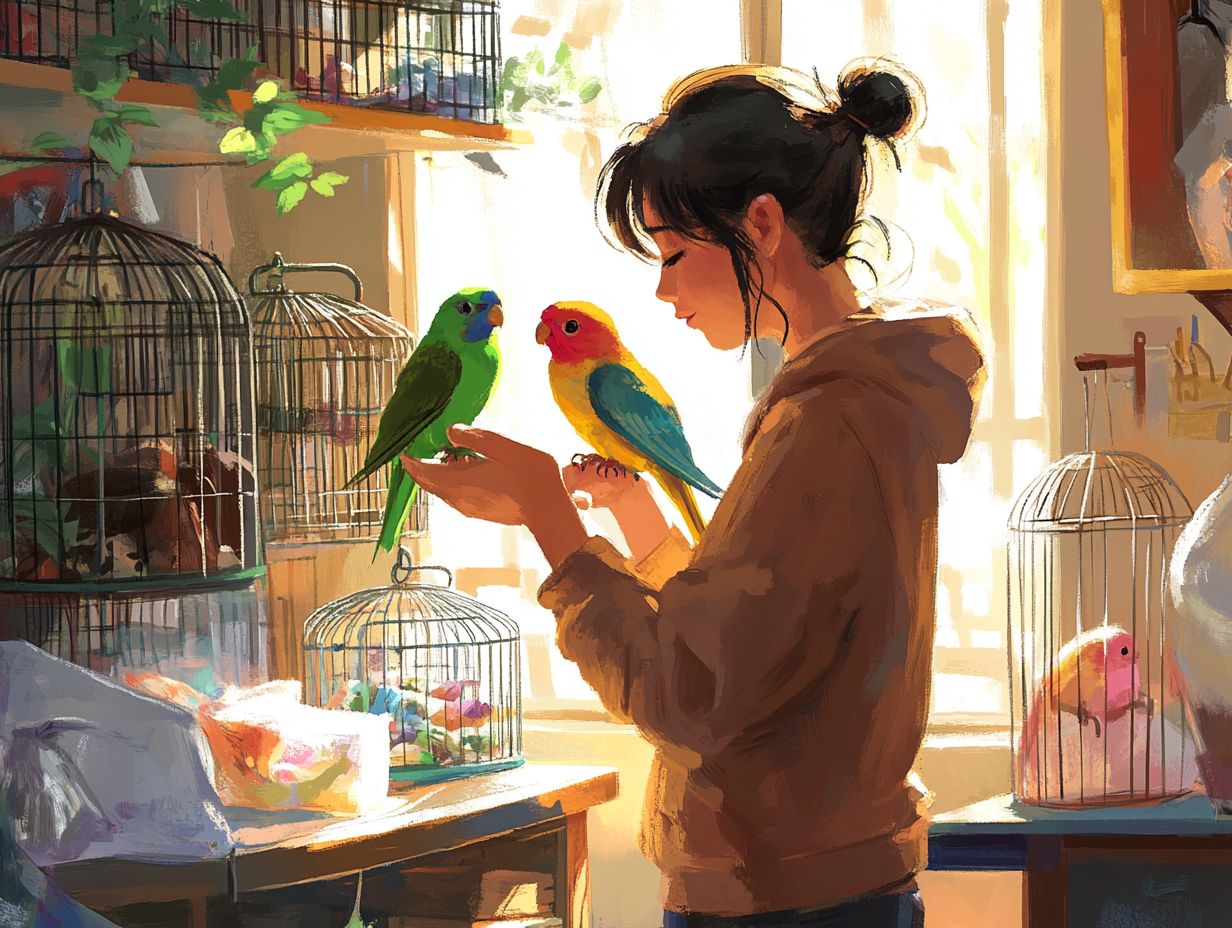
Finalizing the adoption process is a pivotal step that guarantees a seamless transition for both the rescued bird and its new family, paving the way for successful parrot ownership and a dedication to animal welfare.
Get ready to deliver exciting follow-up care instructions, address any concerns that may arise, and ensure that you fully grasp your responsibilities toward your newly adopted feathered friend.
Ensuring a Smooth Transition and Follow-Up Care
To ensure a seamless transition for a rescued bird into its new home, you must provide comprehensive follow-up care guidelines that highlight the responsibilities of parrot ownership, including awareness of adoption requirements. This involves educating yourself on bird safety and the significance of ongoing community support to create a nurturing environment for your newly adopted bird.
This support can take many forms, such as local bird care workshops, online forums, and dedicated community groups that focus on avian health and nutrition, while also providing donation help to support organizations like Charlie Brown Bird Rescue. These resources not only help you address immediate concerns regarding the bird s behavior and acclimatization but also promote long-term well-being by sharing success stories and valuable insights.
Having access to bird doctors and specialists in your community can significantly elevate your care routine, providing guidance on dietary needs, socialization methods, and behavioral training. By tapping into these resources, you can foster a fulfilling relationship with your feathered companion, ensuring a happier life for both you and your bird.
Frequently Asked Questions
1. How do I go about finding a permanent home for a rescued bird?
There are a few options for finding a permanent home for a rescued bird. You can reach out to local bird rescues or shelters, post about the bird on social media, or network with other bird lovers and enthusiasts. Additionally, it’s important to consider understanding the needs of rescued birds to ensure they find the right environment.
2. Can I keep the rescued bird as a pet?

If you have experience and knowledge in caring for birds, you may be able to keep the rescued bird as a pet. However, it’s important to consider if you have the time, resources, and ability to provide a suitable home for the bird.
3. How can I ensure that the rescued bird goes to a safe and loving home?
You can ask potential adopters questions about their experience with birds, their living situation, and their plans for the bird. You can also conduct home visits or ask for references to ensure the bird will be going to a good home.
Conclusion
Responsible bird adoption is crucial for the well-being of both the bird and its new family. If you encounter an abandoned bird, act now by learning how to report abandoned birds for rescue to ensure your feathered friend finds the perfect forever home!
4. What should I do if I can’t find a suitable permanent home for the rescued bird?
If you can’t find a suitable home, contact local bird rescues or shelters. They may have the resources to care for the bird long-term, and you might also want to learn how to help a bird in need before adoption.
5. Is it necessary to have the rescued bird’s medical history before finding a permanent home?
Yes! Providing the bird’s health information helps the new owner understand its needs. This includes any past health issues.
6. Can I ask for an adoption fee when finding a permanent home for a rescued bird?
Yes, it s common to request an adoption fee. This helps cover the bird’s care costs and ensures the new owner can provide the necessary support.

